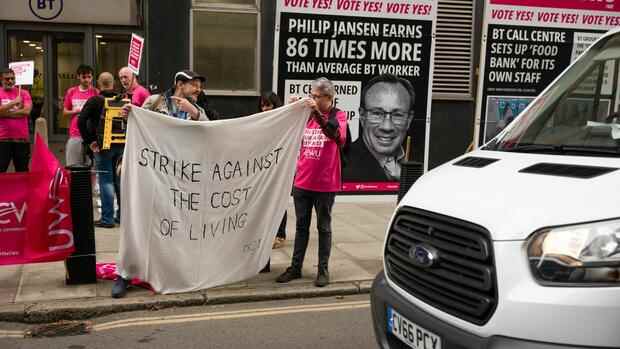British Telecom workers demonstrate against the sharp rise in the cost of living.
(Photo: Bloomberg)
London “Keep calm and carry on.” With this motto, the British made it through the darkest years of World War II. However, the current energy crisis is also unsettling even Britain’s crisis-hardened citizens. More than 100,000 Britons have so far joined the “Don’t Pay UK” campaign, which calls for a boycott of the soaring electricity and gas bills.
Up until now, the average British household has been paying around £2,000 (€2,380) a year for gas and electricity. At the end of August, however, the state regulator Ofgem will announce the next adjustment to the state price cap, which regulates costs for most households.
Market researchers from Cornwall Insight, a UK think tank, predict the cap could be close to £3,600 by the end of the year and then rise to just over £4,200 in the first quarter of 2023. James Smith, economist at the major Dutch bank ING, even expects a peak value of around £5,000 by April.
Too much for many low-income families. “We are calling for energy bills to be brought down to affordable levels,” says the Don’t Pay UK initiative’s website. The initiators want to convince one million people to stop paying their energy bills by October. This should force energy companies to reduce the burden on consumers.
Top jobs of the day
Find the best jobs now and
be notified by email.
It is unclear who exactly is behind the campaign. Specific inquiries went unanswered. The activists want to remain anonymous.
Millions of households are energy poor
The right-wing Conservative Daily Mail reports that they are “militant leftists” with ties to radical environmentalists Extinction Rebellion and supporters of former Labor Party leader Jeremy Corbyn. However, examples from campaign supporters show that even small business owners are rehearsing the uprising.
“We don’t know the group well, but we’re sympathetic to their goal,” says Nick Palmer of the National Energy Action (NEA) charity, which fights growing energy poverty in the UK. According to Palmer, the number of UK households living in fuel poverty will increase from the current 6.5 million to 8.5 million by October. That would be almost every third household in Great Britain. All those who fall below the official poverty line after paying their energy bills are considered energy poor.
The UK Foreign Secretary is a candidate to succeed Prime Minister Boris Johnson.
(Photo: dpa)
However, like other consumer advocates, the NEA advises against a payment boycott. “The legal risks are high,” says Palmer, concerned that a refusal to pay could lead to high debt and being placed under more expensive energy tariffs.
While it seems unlikely at the moment that a million Britons will join the payments boycott by October, the initiative has increased political pressure on the next government. The popular consumer advocate Martin Lewis speaks of a “national crisis” comparable to the pandemic.
The opposition Labor Party has already called for a freeze on energy prices, putting pressure on the two Conservative frontrunners to succeed Prime Minister Boris Johnson. Although three quarters of Tory voters support the Labor proposal, Foreign Secretary Liz Truss and ex-Finance Minister Rishi Sunak are strictly opposed to a price cap. Truss relies on tax increases, Sunak wants to support low-income households with direct financial aid.
Companies show understanding
British energy companies also recognize the social hardship caused by the energy crisis. “These numbers are unimaginably high and beyond the reach of most people in the country,” said Keith Anderson, chief executive of energy group Scottish Power. When demonstrators demand to freeze the upper price limit for gas and electricity, he can “completely understand” their arguments.
Other energy companies suggest that the state should cover the utility bills. These include environmental allowances and value added tax.
That’s not enough for the activists of “Don’t Pay UK”. Like the people’s uprising against the poll tax introduced by Margaret Thatcher in 1990, they want to launch a mass protest. The historical example is likely to make the ruling Tories nervous: the tax boycott was the beginning of the Iron Lady’s political end.
In Germany, the Left Party and right-wing protest groups are already calling for energy protests. The Chemnitz social researcher Piotr Kocyba already warned the German Press Agency of a rage winter.
More: Inflation in the UK rises above 10 percent.
